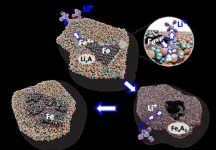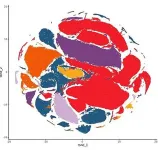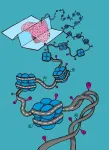(Press-News.org) Deciphering the genetic causes of common neurodevelopmental conditions like autism and common mental illnesses like bipolar disorder has been challenging – not least because of the size and complexity of the human brain – but a new package of research from a global group makes notable progress. Across Science, Science Translational Medicine, and Science Advances, more than a dozen reports from the PsychENCODE Consortium – established in 2015, and dedicated to illuminating the molecular mechanisms underlying schizophrenia, bipolar disorder, and autism spectrum disorder – lay out findings based on examining human brains at the single-cell level. “The massive collection of data from this consortium is also available for other researchers to access to continue building on the insights presented here and to help unlock more secrets of the human brain,” writes Yevgeniya Nusinovich, Senior Editor at Science, in an introduction.
Among the studies in the package, work led by Prashant Emani involving a notably large cohort and a wide range of brain phenotypes describes single-cell sequencing of the prefrontal cortex of individuals with no apparent neurological condition and patients with various neuropsychiatric and neurodegenerative disorders. The result is a detailed resource, called brainSCOPE, based on 388 individual brains, and which the authors used to evaluate links between genetic regulatory elements and brain disorders. Also in Science, Ashok Patowary lead one of the most comprehensive investigations to date of splicing and resulting isoform diversity in the developing human brain – a process with strong links to neuropsychiatric disorders. The study uncovers unique isoforms and it reports on possible links between their cell-type specific expression and neurodevelopmental diseases. In Science as well, work led by Brie Wamsley overcomes limitations in past studies of the precise biological mechanisms driving autism spectrum disorder by leveraging samples from a relatively larger set of individuals than previously studied. The resulting data “solidifies the picture of the major cortical cell types affected in ASD,” say the authors. A study in Science led by William Ruzicka generated single-cell profiles from people with and without schizophrenia to provide a deeper mechanistic understanding of the disease’s drivers. There are several other studies from Science, in the package.
In Science Translational Medicine, Yan Xia and colleagues investigated potential differences in disease burden between males and females for bipolar disorder, schizophrenia, and autism spectrum disorder, at the brain transcriptome level. The authors’ analysis of transcriptomics data from more than 2,000 postmortem brain samples revealed that those from female patients showed a higher rate of transcriptomic dysfunction, compared to males. The authors note their work adds to the growing body of research – related to the “female protective effect” – that suggests that females may require a higher genetic and environmental load to develop these psychiatric disorders. Understanding this sex-specific difference may lead to better treatments for these conditions.
In a study in Science Advances, Chloe Yap and colleagues evaluate brain cell-type shifts – which can inform disease progression – in Alzheimer’s disease, autism, and schizophrenia. Their study involved brains of 1,270 participants. Through their work, the authors found evidence of a potential causal relationship between Alzheimer’s disease and loss of endothelial cells. “These results [...] direct efforts to investigate and prioritize specific cell-types as contributors to neuropsychiatric diagnoses,” say the authors.
The full list of papers in the PsychENCODE package will appear online at the following link on Science's website on Thursday 23 May at 2pm US ET: https://www.science.org/collections/psychencode2. Early results of the PsychENCODE Consortium’s efforts published in the Science family in 2018 can be found here: https://www.science.org/collections/psychencode. Reporters may also be interested in a recent editorial from Science’s Editor-in-Chief Holden Thorp, titled “Science needs neurodiversity.”
END
Latest from PsychENCODE: A cell-by-cell look at neuropsychiatric diseases
2024-05-23
ELSE PRESS RELEASES FROM THIS DATE:
Researchers unveil shared and unique brain molecular dysregulations in PTSD and depression
2024-05-23
Study combines analyses of multiple genomic platforms over multiple brain regions to probe biological processes and underlying mechanisms of stress-related disorders
Results lay groundwork for future diagnostics and targeted treatments
BELMONT, Mass. (May 23, 2024) A comprehensive approach that examines the intersection of multiple biological processes is necessary to elucidate the development of stress-related disorders. In a new study, investigators from McLean Hospital, a member of the Mass General Brigham healthcare system, ...
Iron could be key to less expensive, greener lithium-ion batteries, research finds
2024-05-23
CORVALLIS, Ore. – What if a common element rather than scarce, expensive ones was a key component in electric car batteries?
A collaboration co-led by an Oregon State University chemistry researcher is hoping to spark a green battery revolution by showing that iron instead of cobalt and nickel can be used as a cathode material in lithium-ion batteries.
The findings, published today in Science Advances, are important for multiple reasons, Oregon State’s Xiulei “David” Ji notes.
“We’ve transformed the reactivity of iron metal, the cheapest metal commodity,” he said. “Our electrode can offer a higher energy density ...
Study uncovers cell type-specific genetic insights underlying schizophrenia
2024-05-23
BELMONT, Mass. (May 23, 2024) Schizophrenia is a complex disease with variable presentations, and the diverse nature of this mental health disorder has made understanding the mechanisms that cause the disease, and subsequently developing effective treatments, especially challenging. In a new study, published May 23 is Science, a team led by McLean Hospital researchers used comprehensive genetic and cellular analyses to shed new light on the intricate molecular mechanisms underlying schizophrenia. Their new work provides a map for how the genes known to increase risk of schizophrenia affect specific cells within the brain.
“We discovered which cell types express ...
A promising approach to develop a birth control pill for men
2024-05-23
The world’s population has increased by more than 2.6-fold in the last 60 years. The growing trend continues – projections indicate that the number of people living on our planet will grow to 9 billion by 2037 from 8 billion in 2022. These numbers underscore the need for considering family planning; however, there have been limited breakthroughs in contraception in recent decades. Specifically for men, there are no oral contraceptive pills available.
In a study published in the journal Science, researchers at Baylor College of Medicine and collaborating institutions show in animal models that a novel, non-hormonal sperm-specific approach offers a promising option ...
Artificial intelligence approaches demonstrate how plant science has evolved
2024-05-23
Artificial intelligence approaches demonstrate how plant science has evolved
Machine learning also reveals how model systems have changed and how countries differ in terms of research focus and impact
#####
In your coverage, please use this URL to provide access to the freely available paper in PLOS Biology: http://journals.plos.org/plosbiology/article?id=10.1371/journal.pbio.3002612
Article Title: Assessing the evolution of research topics in a biological field using plant science as ...
Birth of universe’s earliest galaxies observed for first time
2024-05-23
Using the James Webb Space Telescope, University of Copenhagen researchers have become the first to see the formation of three of the earliest galaxies in the universe, more than 13 billion years ago. The sensational discovery contributes important knowledge about the universe and is now published in the prestigious journal Science.
For the first time in the history of astronomy, researchers at the Niels Bohr Institute have witnessed the birth of three of the universe's absolute earliest galaxies, somewhere between 13.3 and 13.4 billion years ago.
The ...
New approach to Epstein-Barr virus and resulting diseases
2024-05-23
The Epstein-Barr virus can cause a spectrum of diseases, including a range of cancers. Emerging data now show that inhibition of a specific metabolic pathway in infected cells can diminish latent infection and therefore the risk of downstream disease, as reported by researchers from the University of Basel and the University Hospital Basel in the journal Science.
Exactly 60 years ago, pathologist Anthony Epstein and virologist Yvonne Barr announced the discovery of a virus that has carried their names ever since. The Epstein-Barr virus (EBV) made scientific history as the first virus proven to cause cancer in humans. Epstein and Barr isolated the pathogen, ...
Tracking the cellular and genetic roots of neuropsychiatric disease
2024-05-23
New Haven, Conn. – A new analysis has revealed detailed information about genetic variation in brain cells that could open new avenues for the targeted treatment of diseases such as schizophrenia and Alzheimer’s disease.
The findings, reported May 23 in Science, were the result of a multi-institutional collaboration known as PsychENCODE, founded in 2015 by the National Institutes of Health, which seeks new understandings of genomic influences on neuropsychiatric disease. The study was published alongside related studies in Science, Science Advances, and Science ...
Pioneering new study uncovers insights into PTSD & major depressive disorder
2024-05-23
AUSTIN, Texas — Stress-related disorders like post-traumatic stress disorder and clinical depression are complex conditions influenced by both genetics and our environment. Despite significant research, the molecular mechanisms behind these disorders have remained elusive. However, researchers at Dell Medical School at The University of Texas at Austin have broken new ground with a study that sheds light on the intricate differences occurring in the brains of people with PTSD and depression compared to neurotypical controls. The study, published this week in Science, could provide potential avenues for novel therapeutics and biomarkers.
“Understanding why some people develop ...
Two new studies by Mount Sinai researchers in science offer key insights into the origins and potential treatment of mental health disorders
2024-05-23
Working under the umbrella of the PsychENCODE Consortium, the mental health research project established in 2015 by the National Institutes of Health, a team of Mount Sinai scientists has uncovered important new insights into the molecular biology of neuropsychiatric disease through two new studies published in a special issue of Science on Friday, May 24. These investigations, conducted with colleagues from other major research centers, involve the largest single-cell analysis to date of the brains of people with schizophrenia, and a first-of-its-kind ...




